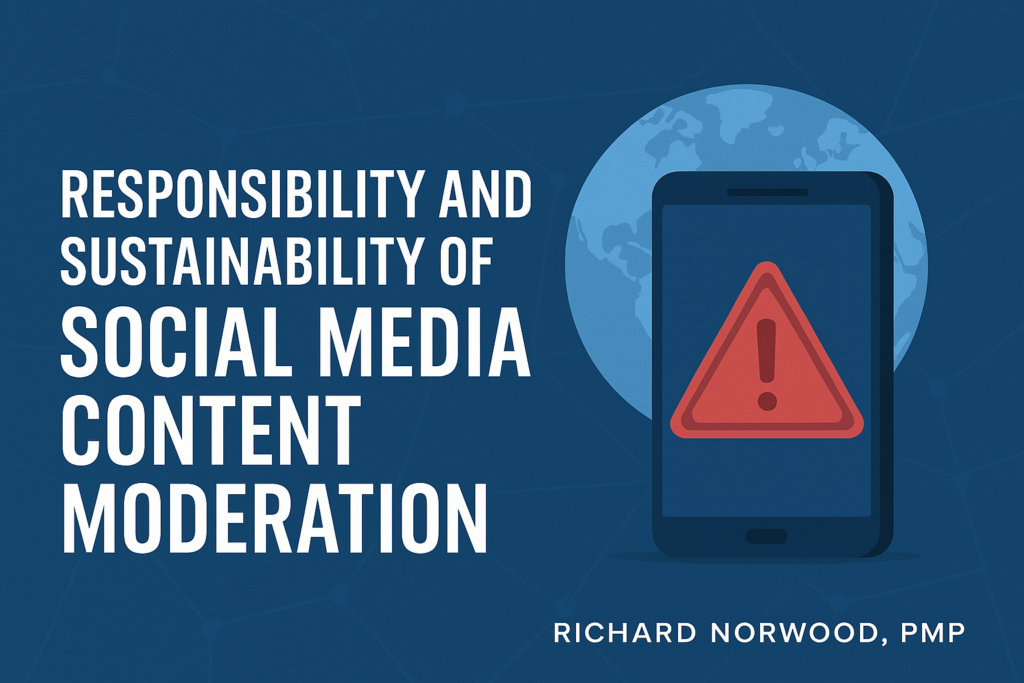
By Richard Norwood, PMP – Founder, Alabrida Revenue Architects LLC
For all the promise of connection, social media continues to reveal its darker potential—especially in countries where the consequences of unchecked digital influence are measured not in clicks, but in lives.
In the groundbreaking essay “Responsibility and Sustainability of Social Media Content Moderation” (The Journal of Social Media in Society, 2024), scholars Dev Roychowdhury and Kibrom Berhane Gessesse argue that the failures of platforms like Facebook in countries like Ethiopia are not just ethical oversights—they’re systemic threats to sustainability, security, and human rights.
As a strategist who works with organizations to build trustworthy, human-centric digital ecosystems, I believe this is a moment of reckoning for how we design, moderate, and monetize digital experiences.
The Ethiopia Case Study: A Digital Crisis of Global Importance
The authors spotlight how Facebook’s lack of content moderation capacity—just one Amharic-speaking fact checker for the entire country—contributed to ethnic violence, hate speech, and misinformation during Ethiopia’s Tigray conflict.
“Despite ranking Ethiopia in its highest priority tier, Facebook failed to build localized systems or respond to repeated internal alarms.”
— Roychowdhury & Gessesse (2024)
It’s a painful but powerful example of what happens when global platforms ignore local context—and why ethical content moderation must become part of the modern revenue model.
3 Takeaways for Leaders, Brands, and Builders
Whether you’re a startup founder, health care provider, or SaaS company scaling across borders, this crisis offers a blueprint for what not to do—and how to build responsibly.
1. 🌍 Content Moderation Is a Global Responsibility
Platforms can’t afford to operate on a “profit-first, ethics-later” model. Localization, language support, and cultural fluency must be engineered into moderation workflows. I build this into my Conversion Blueprint by embedding tone checks, compliance rules, and audience intelligence into marketing systems.
2. 🔍 Frictionless Design Can Be Dangerous
The authors warn about “frictionless” platforms that prioritize engagement over ethics. If your funnel rewards outrage or controversy, it may convert in the short term—but at what cost? At Alabrida, we build trust-based automation that fuels long-term brand loyalty.
3. 🧠 Digital Literacy Is Part of Your Tech Stack
In places like Ethiopia, a lack of media literacy made users especially vulnerable. In business, this plays out when customers misunderstand pricing, features, or data privacy. My team incorporates onboarding, tooltips, and micro-training into every platform we build or optimize.
Why This Matters to Your Brand
Whether you operate locally or globally, your digital presence has power—to inform or mislead, to build up or break down trust.
That’s why my work focuses not just on converting leads, but on creating responsible ecosystems that:
✔️ Align with local and international compliance
✔️ Include ethical AI and automation
✔️ Prioritize long-term user trust
✔️ Avoid exploitative engagement loops
Final Thought: Virality Without Responsibility Is a Risk Multiplier
We can’t afford to separate growth from governance.
Social platforms, tech startups, and digital-first brands must now view content moderation and audience safety as core to sustainable scale. Whether you’re selling software or healthcare, ethics must be as scalable as your funnel.
📅 Ready to build a conversion strategy that scales and sustains?
Book a FREE 30-minute consult today. Together, we’ll build systems that convert without compromising integrity.
Schedule now → https://tinyurl.com/free-strategy-meet
📌 Source: “Responsibility and Sustainability of Social Media Content Moderation”, The Journal of Social Media in Society, 2024
Roychowdhury, Dev, and Kibrom Berhane Gessesse. “Responsibility and Sustainability of Social Media Content Moderation.” The Journal of Social Media in Society, vol. 13, no. 2, Dec. 2024, pp. 284+. Gale Academic OneFile, link.gale.com/apps/doc/A828324081/AONE?u=21667_hbplc&sid=bookmark-AONE&xid=d1d56d8b. Accessed 2 Apr. 2025.
